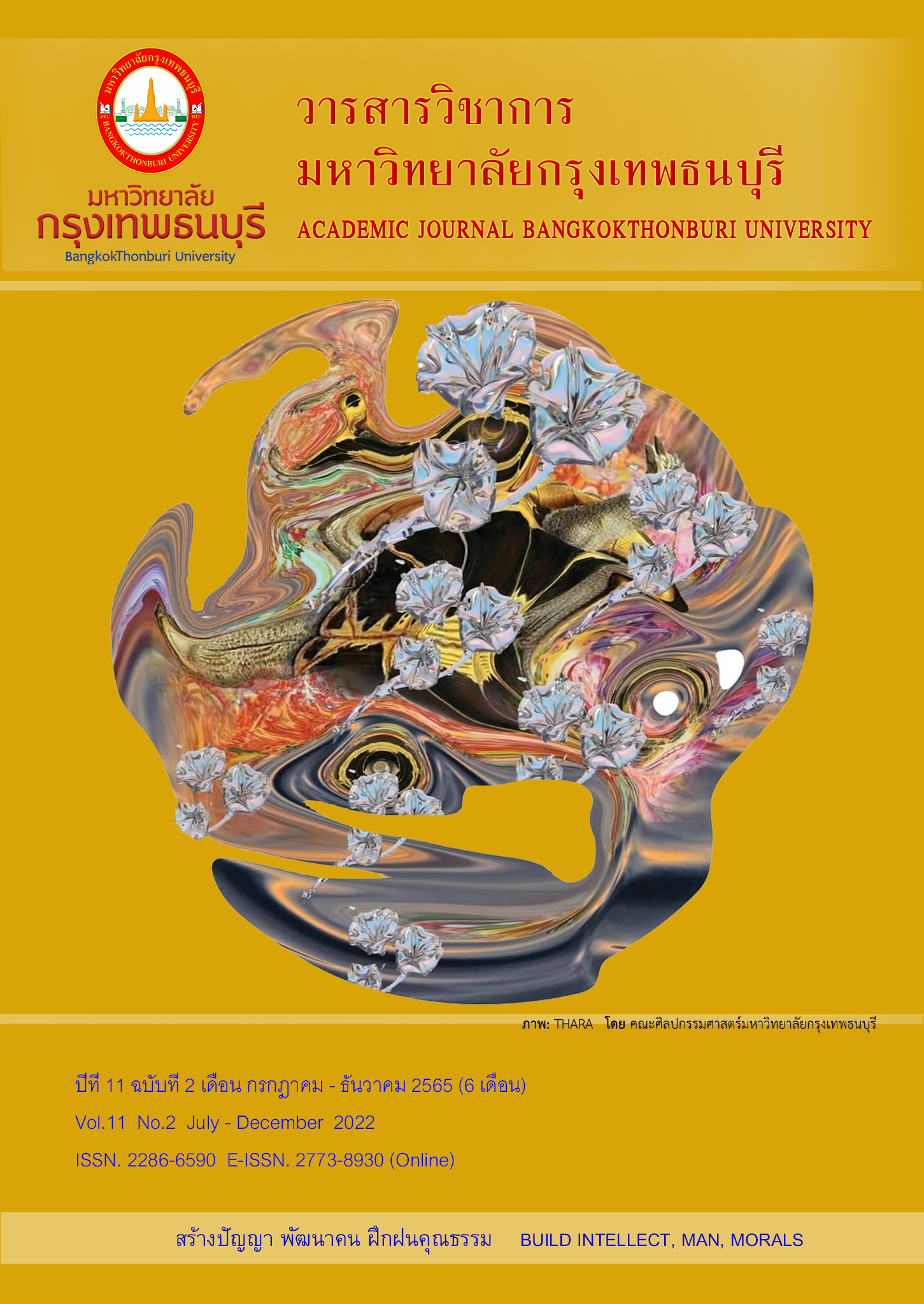Using Applications to Promote the Education Supervision System on Coaching Model of Bachelor’s Degree Student of Faculty of Education
Main Article Content
Abstract
This research the objectives are were 1) develop applications to promote the educational supervision system in the form of coaching for undergraduate students in the Faculty of Education and Education. To ensure quality and efficiency. 2) to Compare test scores before and after using the application. To promote the educational supervision system in the form of coaching for undergraduate students in the Faculty of Education and Education; and 3) to Study the opinions of using the application. To promote the educational supervision system in the form of coaching for undergraduate students in the Faculty of Education and Education. The sample used in the research is an undergraduate student in the Faculty of Education and Education Higher Education Institutions in Thailand obtained by a simple random sampling method. By drawing lots from 3 universities, 12 classrooms with a total of 365 students. Research tools were 1) an application on educational supervision in the form of Coaching 2) a test before using the application application, 3) a post-application test, 4) an application quality assessment questionnaire, and 5) an application usage questionnaire. To promote the educational supervision system in the form of coaching for undergraduate students. Faculty of Education and Education Statistics used for data analysis include finding performance. and the quality of the application, mean, standard deviation and t-test.
The results of the research were as follows: 1) an application to promote the educational supervision system in the form of Coaching of undergraduate students, Faculty of Education and Science. content quality and technical in a very good level and the efficiency is 80.08/82.58 2) test score after using the application higher than the test score before using the application with statistical significance at the .05 level and 3) The results of the study of opinions on the use of the application to promote the educational supervision system in the form of coaching of undergraduate students in the Faculty of Education and Education. Make students have knowledge and understanding of the subject. The educational supervision system in the form of coaching has increased, allowing students to access content at any time. and every place and can cause content memorization and increase long-term memory.
Article Details

This work is licensed under a Creative Commons Attribution-NonCommercial-NoDerivatives 4.0 International License.
References
กฤษณะ วุฒิพันธุ์ชัย. (2559). ต้นแบบโมบายแอปพลิเคชันแพลตฟอร์มเพื่อการเกษตรยุคดิจิตอล. วิทยาศาสตรมหาบัณฑิต สาขาวิชาการบริหารเทคโนโลยี วิทยาลัยนวัตกรรม มหาวิทยาลัยธรรมศาสตร์.
ชัยยงค์ พรหมวงศ์. (2556). การทดสอบประสิทธิภาพสื่อหรือชุดการสอน. วารสารศิลปากรศึกษาศาสตร์วิจัย, 5(1), 7-19.
ฐาปนีย์ ธรรมเมธา. (2557). อีเลิร์นนิง: จากทฤษฎีสู่การปฏิบัติ e-Learning: from theory to practice. กรุงเทพฯ: มหาวิทยาลัยไซเบอร์ไทยสำนักงานคณะกรรมการการอุดมศึกษา.
ณัฎฐ์ฤทัย อรุณศิโรจน์ และคณะ. (2564). การใช้เกมแอปพลิเคชันในการพัฒนาการเรียนรู้ระบบคำภาษาอังกฤษ ของผู้เรียนที่เรียนภาษาอังกฤษเป็นภาษาต่างประเทศ. วารสารวิชาการ มหาวิทยาลัยฟาร์อีสเทอร์น, 15(1), 47-63.
นิตยา ย้อยแก้ว และคณะ. (2564). การพัฒนาสื่อแอปพลิเคชันความจริงเสริมร่วมกับการจัดการ เรียนรู้โดยใช้คำถาม ตามแนวทฤษฎีคอนสตรัคติวิสต์เพื่อเสริมสร้างทักษะการคิดวิเคราะห์ ของนักเรียนชั้นประถมศึกษาปีที่ 2 โรงเรียนเซนต์คาเบรียล. วารสารเทคโนโลยีสื่อสารมวลชน มทร.พระนคร, 6(1): 53-62.
บุญชม ศรีสะอาด. (2554). การวิจัยเบื้องต้น. พิมพ์ครั้งที่ 9. กรุงเทพมหานคร: สุวีริยาสาส์น.
ปรัชกร พรมมา. (2559). การพัฒนาแอปพลิเคชันเกมสามมิติประเภทสวมบทบาทเพื่อพัฒนาทักษะการเรียนรู้คําศัพท์ภาษาอังกฤษ สําหรับนักเรียนชั้นประถมศึกษาปีที่ 2 ที่มีความรู้ด้านภาษาอังกฤษในระดับต่ำ. มหาวิทยาลัยเกษตรศาสตร์.
ยุพิน รสภา และคณะ. (2561). การพัฒนาผลสัมฤทธิ์ทางการเรียน ของนักศึกษาระดับประกาศนียบัตรวิชาชีพชั้นสูงด้วยเทคนิคเพื่อนเรียน โดยอาศัยแอปพลิเคชัน. วารสารวิทยาศาสตร์และเทคโนโลยี มหาวิทยาลัยราชภัฏมหาสารคาม, 1(1), 26-29.
ล้วน สายยศ และ อังคณา สายยศ. (2553). เทคนิคการวิจัยทางการศึกษา. พิมพ์ครั้งที่ 11 กรุงเทพฯ: สุวีริยาสาสน์.
สำนักงานเลขาธิการสภาการศึกษา. (2553). ข้อเสนอการปฏิรูปการศึกษาในทศวรรษที่สอง (พ.ศ. 2552-2561). กรุงเทพฯ: พริกหวานกราฟฟิค จํากัด.
สุชาติ เพชรเทียนชัย และคณะ. (2565). การพัฒนาแอปพลิเคชันเพื่อการเรียนรู้ วิชาฟุตบอล สำหรับ นักศึกษามหาวิทยาลัยราชภัฏหมู่บ้านจอมบึง. วารสารสุขศึกษา พลศึกษา และสันทนาการ, 48(2), 14-27.
ศุภวรรณ สัจจพิบูล. (2560). แนวคิดการนิเทศเพื่อพัฒนาสมรรถนะการจัดการเรียนรู้ในศตวรรษที่ 21 (Supervision Concepts for the Development of Learning Management Competencies in the 21st Century). วารสารมหาวิทยาลัยศิลปากร, 37(1), 203-222.
โฮกุโตะ ชิบาซากิ และคณะ. (2564). การพัฒนาแอปพลิเคชันบทเรียน วิชาภาษาอังกฤษ ระดับชั้นมัธยมศึกษาปีที่ 2. Lawarath Social E-Journal, 3(2), 31-45.
Blanchard and Thacker. (2004). Effective Training System: System, Strategies and Practices. 2nd ed. New Jersey: Pearson Prentice Hall.
Gagne, R., Briggs, L, and Wager, W. (1992). Principles of Instructional Design. New York: Holt,Rinehart, and Winston.


